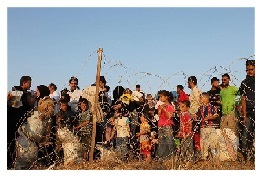Syrians and Kurds need urgent help and protection
Based on this knowledge, the protection of the Syrian people, including the Kurds, from destruction, extremist ideologies, and the Assad regime is an international duty. This is why an international intervention, as the first stage, is urgent.
The Ba’ath regime led by Bashar Al-Assad is continuing its daily bombardment and attacks on residential areas in Syria. The Assad regime uses heavy artillery and does not differentiate between civilians and insurgents. Consequently, the number of civilian victims is rising. The conflict is expanding and spawning internal conflicts. Now several mini-ethnic conflicts have broken out, such as the conflict between the Arabs and the Kurds, and the Sunni and Shia Muslims. There is no doubt that the main victims of this war are the innocent civilians who have been suffering under harsh living conditions and a lack of security.
The Free Syrian Army (FSA), which has Turkish and Western support, includes many political and religious parties, from nationalists and Islamists to other moderate political parties. Some foreign Islamists have also joined the Syrian Islamists and the FSA. The extremists, such as Jabhat al-Nusra and Ghuraba al-Sham, do not hesitate to attack and kill civilians, as we have witnessed with the use of car bombs for mass casualties. These extremist elements make the situation more dangerous and tense. The Islamists have imposed Shari´a law on the areas under their control and do not tolerate any other faiths. Therefore, Syria is now a fertile ground for the recruitment of Islamist extremists, and ethnic and religious minorities have good reason to worry about what the future has in store for them.
Strengthening the FSA by supplying weapons, as suggested by some countries, will aggravate what is already an unsafe situation, and these arms will undoubtedly fall into the hands of Islamist groups. Subsequently, Iran and Russia will increase their support for the Assad Regime. If the international community takes this direction, the inevitable outcome will be more destruction.
In November and January, Islamist groups attacked the Kurdish controlled area, particularly Serekanyia city. In the meantime, the Arab forces created an embargo circle around the Kurdish area. Thus, the defenseless civilians in the Kurdish cities and villages were short on food and other necessary supplies. As a result, many of them fled to Iraqi Kurdistan or other places. They continue to be afraid, due to the threat from the Arab militias, if they defeat the Kurdish protection forces.
The Kurds, who have been cruelly oppressed by the Ba’ath regime since the 1960s, are now free from the regime. The Kurdish political parties under the umbrella of the Supreme Kurdish Authority have refused to join the FSA, which has denied Kurdish cultural and political rights. The Kurds will not allow the FSA to take control over their region. Kurds have organized protection forces in the area. The FSA deems this unacceptable, as does its close supporter, Turkey. Thus, the Islamist rebels launched a war against the Kurds for control over the Kurdish area, but they failed.
The Arab leaders of the FSA will not likely address the Kurdish question after the fall of the Assad regime. In other words, a free and strong Kurdish community is not on the agenda of either the FSA or Turkey. In fact, Turkey is deeply involved in the conflict. It supports the FSA, perhaps by supplying it with weapons and other logistic necessities and support. Turkey has strong national interests in Syria and is especially opposed to Kurdish autonomy in Syria.
The Kurdish forces have managed to stop the attacks. There is a weak agreement resulting from ongoing negotiations, but the shadow of fear due to the continual threat still covers their region. Few Kurds believe that this ceasefire agreement will hold.
Despite the focus of the West and the international community on the war between the Syrian Army and the FSA and the mass killings and destruction of this war, there is no specific intention concerning the internal conflicts, especially between the FSA and the Kurds. The war within this war is equally risky and could be catastrophic. The extremist militias of the FSA regard the Kurds as traitors because of their difference of opinion and ethnic demands. There is anti-Kurdish mobilization, distrust, and hate speech against the Kurds. Further, there is a territorial conflict and ethnic distrust in the multiethnic cities. There also exist extremist ideologies, exemplified by the Arab Islamists and the ethno-nationalists. The ongoing internal war has been destructive, and the Kurds have not received international attention. The Kurds are struggling for their freedom, and the Kurdish minority cannot defend against the Arab majority forever. Moreover, there are external powers that want to neutralize the Kurds. If we take all these facts into consideration, there is a real risk for ethnic cleansing and genocide to reduce the Kurdish minority to an insignificant number in Syria.
In 2003, we witnessed what the Arab Janjaweed militia did to the people of Darfur in Sudan. We also witnessed the killings of the minorities during the internal Yugoslavian war in Srebrenica in July 1995, right before the eyes of the UN forces and the international community.
Based on this knowledge, the protection of the Syrian people, including the Kurds, from destruction, extremist ideologies, and the Assad regime is an international duty. This is why an international intervention, as the first stage, is urgent. Then a state building and democratization program in the post-Assad regime era must immediately follow.
Syria comprises several religious and ethnic groups, and they have the right to be involved in a new political system that accepts the variety of the Syrian people. For instance, the Kurd–Arab conflict can be resolved by the democratization of a political system that constitutionally recognizes the political and cultural rights of the Kurds.
By Shakhawan Shorsh
5. March 2013


سەرنج بنێرە